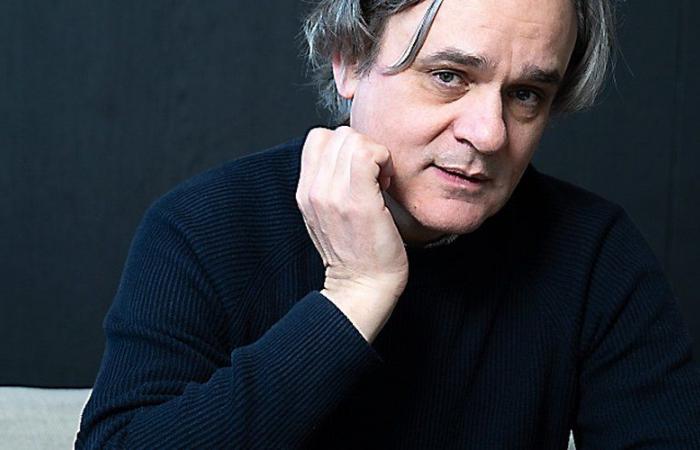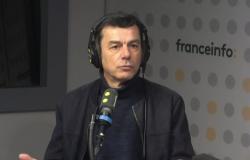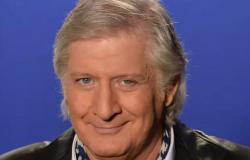
The director of “Charlie Hebdo”, Riss, granted Midi Libre an interview ten years after the attacks of January 7, 2015. The satirical newspaper pays tribute to the eight victims of the newspaper in “Charlie Liberté. The diary of their life” (Les Échappés, 224 pages, €29.90), a moving book.
Riss was seriously injured in the attack
Riss was seriously injured in the shoulder in the Charlie Hebdo attack. On January 20, 2015, Riss gave this account of the events in “Le Monde”: “The door opened, a guy in black appeared with a machine gun. He found himself face to face with Charb”, reminds Riss. “And then I saw that the others around me were trying to look to the right and to the left, perhaps to find a way out. They were standing. I threw myself on the ground, face down. And from then on I only heard sounds, and the sounds in question were gunshots, no screams, just gunshots.
“The last image,” he explained to us in September 2023, “is that of those who were with us. The last thing I saw of them. They were standing, alive, around us. So for for me they remain standing, alive.”
You pay tribute to the victims of January 7 through their drawings, their works, a book in the form of an ode to freedom. Is this also a way of showing that this Islamist terrorism which wanted to silence them will never prevail?
In any case, that’s what we hope for. And this is the minimum that Charlie Hebdo reaffirms ten years later, it would be problematic if we were not always as combative today.
What was this day of January 7, 2025, like in the editorial office of Charlie Hebdo, these last moments that you all shared together?
It was an editorial conference like any other, it was lively, it was joyful. There was nothing to foreshadow what would emerge a few minutes later in the meeting. As they were leaving, that’s when the two terrorists appeared.
What impression did your memory have of the moments that followed, “those seconds when the bullets slammed,” in your words?
When you see someone in front of you who is armed and you have no escape route, you understand that you are going to die. I was convinced that I was living my last moments.
It’s a rather special feeling that you never get rid of.
It is an experience that imprints itself on you and becomes part of you for the rest of your life.
Today, in what conditions does Charlie Hebdo work?
This is writing that is protected. We try to make the designers and editors feel good inside the newspaper. It’s a place where they no longer have to question whether they are safe or not.
But we must always be vigilant, even ten years later.
You are subject to a fatwa. Is this post-January 7 a life on the lookout for you?
As far as I’m concerned, yes, that’s somewhat true. You should always take precautions.
We are never safe from an isolated act, we must take into account the fact that people might want to do it again.
A noise in the street, a car parked incorrectly in front of your home, these are all signs that can worry you, explain in the book “Charlie Liberté”.
Yes, to take just these examples. It’s a bit weird, but we try to reassure ourselves by being careful. Even if it can be a little absurd sometimes, too bad…
Today, numerous security measures are taken whenever you travel. “A spider’s web has been woven around us, of which we are prisoners,” you say. What did you have to give up?
I can’t give details about security, but the newspaper has to continue and so there was a form of pact, taking care of Charlie, that involves constraints as far as I’m concerned.
We cannot be careless, we must be forward-thinking, we cannot walk with our noses in the wind in the street, we must not be naive.
“Salman Rushdie believed he could get his life back, he paid dearly for it,” you write. Does this mean that you are resigning yourself to living locked in this bubble in perpetuity?
It’s a bubble, but at the same time, you have to find your place in it to do what you want to do. That doesn’t stop me from doing a certain number of things. Afterwards, in perpetuity, I don’t know. It can last a long time, but you always have to tell yourself that things can change.
Has the Charlie editorial team been the subject of new threats?
Not lately. Two years ago, when we made drawings about the Supreme Guide of Iran, people got angry…
When there are threats, it sets the tone for the times, it creates a climate. But are these necessarily real threats? It’s not safe. We don’t see serious threats. They don’t express themselves. Terrorist plans are never announced.
-You mention Iran. Charlie Hebdo has today become a symbol of freedom well beyond our borders, to which many Iranian women in particular cling. What does this mean to you?
This shows that we must show solidarity with each other, not only in France, but with all the people who are confronted with this kind of arbitrariness in the world.
In some countries, when you talk to them about Charlie Hebdo, they understand what it means, because they too are faced with religious intolerance. Unfortunately, there are many other places in the world where it speaks out and oppresses people.
Charlie tries to participate in this solidarity, anything that can create a link in the world between the different categories of people attacked, whether journalists, police officers, or Jews.
What remains of the historic parades of January 11? Is France still Charlie?
On January 11, there were demonstrations of solidarity with the victims of the attack. Many marched, moreover, without knowing very well what Charlie Hebdo was.
Afterwards, when they discovered the newspaper, some, perhaps, didn’t really like it. So saying “I am Charlie” does not necessarily mean “I read Charlie”.
It was support in principle for the freedom of the press and artists. The people who marched were attached to freedom of expression of which Charlie is one actor among others, to the values of the Republic, which is already very important, that’s the main thing.
How is Charlie doing today? How has broadcasting evolved since this tragedy?
Sales in 2015-2016 were very high, but they were atypical. It was linked to events, we knew very well that we would then return to more conventional sales, which also correspond somewhat to what other newspapers are experiencing. It’s the evolution of the paper press, that’s another story…
In any case, the survival of the newspaper is not threatened today on an economic level?
So far, so good. The newspaper is profitable and balanced.
Would you be ready, tomorrow, to republish the caricatures of Mohammed?
We did it in 2020 for the trial, because we considered it important to show the causes. To show that these drawings, ultimately, with hindsight, were not as terrible as what we wanted to say. Because the less you show things, the more people fantasize. Should they be republished? It depends on the context. There must be a good reason, there must be at least one educational virtue.
To explain what happened ten years ago, we must explain what was published almost twenty years ago, in 2006. So it is in this spirit that we could re-show them. These are no longer topical drawings, they have another dimension, these caricatures have entered history.
Behind all the big speeches, do you have the feeling that there is a form of self-censorship in France today?
Even for the teaching staff, who are deprived, it is also difficult to address these subjects. We can understand that teachers are not always very comfortable, you didn’t do this job to find yourself in a situation of having to talk about all this. It’s a bit unusual for teachers to be in this position, it’s difficult. I am not a specialist in National Education, I will not pass judgment.
But are teachers supported by their hierarchy, in this pedagogical work that they do to explain what secularism is?
This is the question we must ask ourselves.
You point out in your book, without naming it, the attitude of LFI. How do you read his strategy?
I am not going to dwell on political considerations, but when you are on the left and when you know a little about its history, you are still a little disconcerted by the evolution of a fringe of the left. In my opinion, it is doomed to failure. The future of the left is not that.
Have we learned the lessons today from the attacks, which were followed by the assassination of Samuel Paty in 2020, then of Dominique Bernard in 2023?
There is, however, a before and an after. We cannot say, today, that we are in the same situation as in 2013, 2014, where part of the political class, where leaders of this country were perhaps not necessarily aware of the threat posed by this Islamist religious fundamentalism.
Today, it is better identified. And a lot of work has been done by researchers, academics that supports all of this.
We published the caricatures of Mohamed in 2006 because we thought that people did not realize the danger of Islamist fundamentalism. I think others have taken over today. Other voices were raised to warn. Everything is not perfect, there is still a lot of teaching to do, but there is awareness.





